Bruno Fernandes interview: "Manchester United wanted a winning mentality – and needed one"
Manchester United talisman Bruno Fernandes is the Red Devils' greatest hope since Eric Cantona. In this exclusive interview, the Portuguese star tells FFT how determined he is to get United back on their perch...
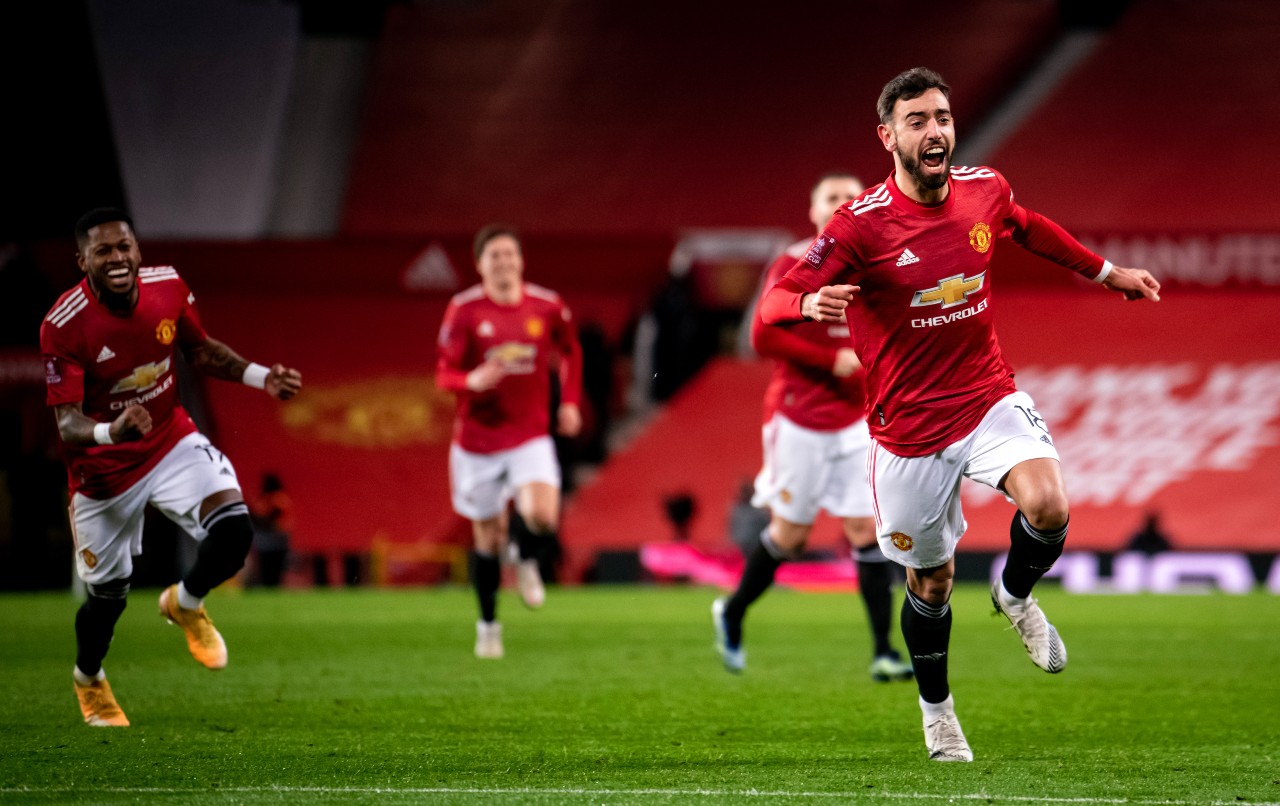
This exclusive interview with Bruno Fernandes first appeared in the May 2021 issue of FourFourTwo magazine. Subscribe now and get your first five issues for £5!
“I was a mini ultra,” Bruno Fernandes tells FourFourTwo, as a grin flashes across his face. “I used to go and watch Boavista games when I was a boy. I was the ball boy, and then a mini ultra behind the goal. I like the atmosphere of the ultras when it’s expressed in the right way. I like to be part of the atmosphere when they try to push the players on and motivate them.”
Boavista are based in Porto and Fernandes grew up in Maia, six miles north of Portugal’s second city.
“I’m a Boavista supporter and started to watch them play because of my cousin, Vitor Borges, who came through the youth system to make their first team. I wanted to follow him and make the same steps. He’s 36 now, a right-back. I used to be a defender as well – unluckily for me I was a centre-back until I was 15! I didn’t score a lot of goals then… but I’m scoring now.”
He can say that again. Life as a professional footballer and Manchester United’s talisman was a long way down the line in those days, but that meant Fernandes could still attend matches as a fan.
“I’d go to games and sing the songs,” he remembers. “I didn’t have a hero as a player, they were just my dad and my brother – they both played football too.”
The 26-year-old grew up in a household soaked in football culture. “Boavista’s derby is against Porto,” he explains to FFT. “A long time ago, they were league champions [in 2001, after which they played United in two Champions League games, losing both 3-0] and the atmosphere was much better there. Now, you would see more Porto fans than Boavista fans in their own stadium. But the Estadio do Bessa is really beautiful... it’s an English-style stadium.”
Get FourFourTwo Newsletter
The best features, fun and footballing quizzes, straight to your inbox every week.
The whip and the dip 💥Something special from Bruno Fernandes 🙌📺 Watch on Sky Sports PL📱 Follow #MUNEVE here: https://t.co/hynlfysVWV📲 Download the @SkySports app! pic.twitter.com/VOuB3Su1WwFebruary 6, 2021
Fernandes doesn’t talk to the media much – when he does, it’s often in short snippets for television stations looking for soundbites on current form and the next game. It’s why the Portuguese midfielder is so keen to speak more about his football upbringing off the pitch with FFT, revealing how the atmosphere in his home country compares to grounds on English shores.
“In Portugal, the atmosphere is intense,” he continues. “We have ultras in Portugal and in Italy also, where I played for five seasons. They are more passionate than rational. In Italy, it’s more passionate like Portugal. The supporters live through football. For them, it’s expressed in the game.
“In England, I feel like the people come to enjoy the game as a show, like the theatre or the cinema. The atmosphere is more clean. But in England, every game is played in a full stadium – it doesn’t matter which team you play against. The atmosphere is really good and it’s nice to feel it.”
Red moon rising
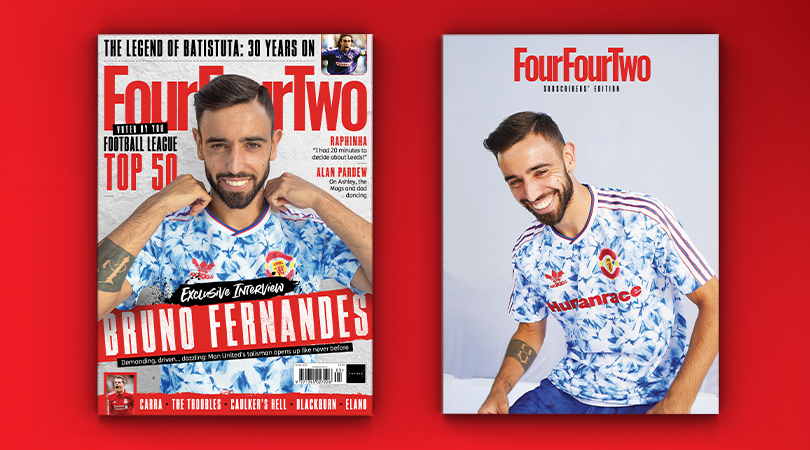
Bruno Fernandes had only been playing in England for six weeks when lockdown hit, after his £47 million transfer from Sporting to Manchester United was finally completed in late January 2020.
In that short period through February and early March, however, the schemer became a much-needed hero for a side desperately seeking one, and quickly convinced United fans that he was exactly what they needed.
Fernandes didn’t take long to show what lay ahead at Old Trafford, demonstrating in the opening five minutes of his debut against Wolves that he was different from the rest. For starters, he could move the ball towards something that had been eluding United’s attackers: the goal.
Fifth in the league and sliding, Ole Gunnar Solskjaer’s charges had suffered a wretched month in January 2020, and been defeated by Arsenal, Manchester City, Liverpool and Burnley. The air was mutinous after the 2-0 reverse to the latter, the invective infecting a usually supportive home crowd.
Bruno calmed the storm. Form improved, spirits rose and the Red Devils began to climb the table, reaching third spot in the final week of the Premier League campaign to secure Champions League football. Solskjaer’s side had been six points off the pace following the Portuguese maestro’s debut, and some 14 behind Leicester, who they would eventually overtake. Some of the new man’s displays – like when he combined exquisitely with Paul Pogba against Brighton after lockdown, for example – lifted hopes of a bright red future.
Blistering pace from Manchester United on the counter-attack! 🔥Bruno Fernandes finishes off a wonderful move! 💥📺 Watch on Sky Sports PL📱 Follow #BHAMUN here: https://t.co/yN2PHcPhp2📲 Download the @SkySports app! pic.twitter.com/GuZ0VvnUviJune 30, 2020
But how and why did Fernandes become the figurehead so quickly?
“He’s top class in so many ways,” explains Manchester United’s new technical director, Darren Fletcher. “He can disguise the final execution of a pass, so that defenders can’t see it coming. He has already seen it two or three moves earlier, because he’s constantly checking his shoulders and painting pictures before he receives the ball. He’s two or three seconds ahead of the game, and then when he gets the ball, his first touch is immaculate. It’s one thing being able to see the pass, but another to execute it.”
Fletcher also singles out Fernandes’ courage.
“He always tries that [killer] pass, and it doesn’t matter how many times he loses the ball,” the ex-Scotland captain tells FFT. “He never loses faith in himself, and never loses his belief in what he thinks are the right things to win the game. He takes that burden on his shoulders like a proper United player should do.
“All the great United players have had that, and it’s the biggest courage you can have on the pitch. Giggsy had the biggest pair of balls in that respect – he was always looking to hurt sides with passes and flicks around the corner. He had superb imagination, even when the supporters were on his back. He would give the ball away four times before it came off.”
Fletcher isn’t finished – in fact, he calls FFT back to make another point on Bruno, who he has been watching closely from a seat at the back of Old Trafford’s main stand.
“Look at his reaction to losing the ball,” he says. “Fans don’t mind players losing the ball, it’s how they react. He goes with aggression and purpose to make up for his error. He doesn’t just run around the pitch crazily, he does it in the context of what’s right for the team. He recognises when it’s the right time to do it for the team.”
And there’s more...
“Oh, and the distances that he covers are massive,” adds Fletcher. “That’s to do with his work rate off the ball, but it’s also how much he moves to get on the ball. He always gets into space and does the opposite movement to get away from defenders. The amount of running Bruno does between the lines in that No.10 position to actually get the ball makes his distances soar through the roof. He also plays week in, week out. He’s a proper player – a top, top-class player.”
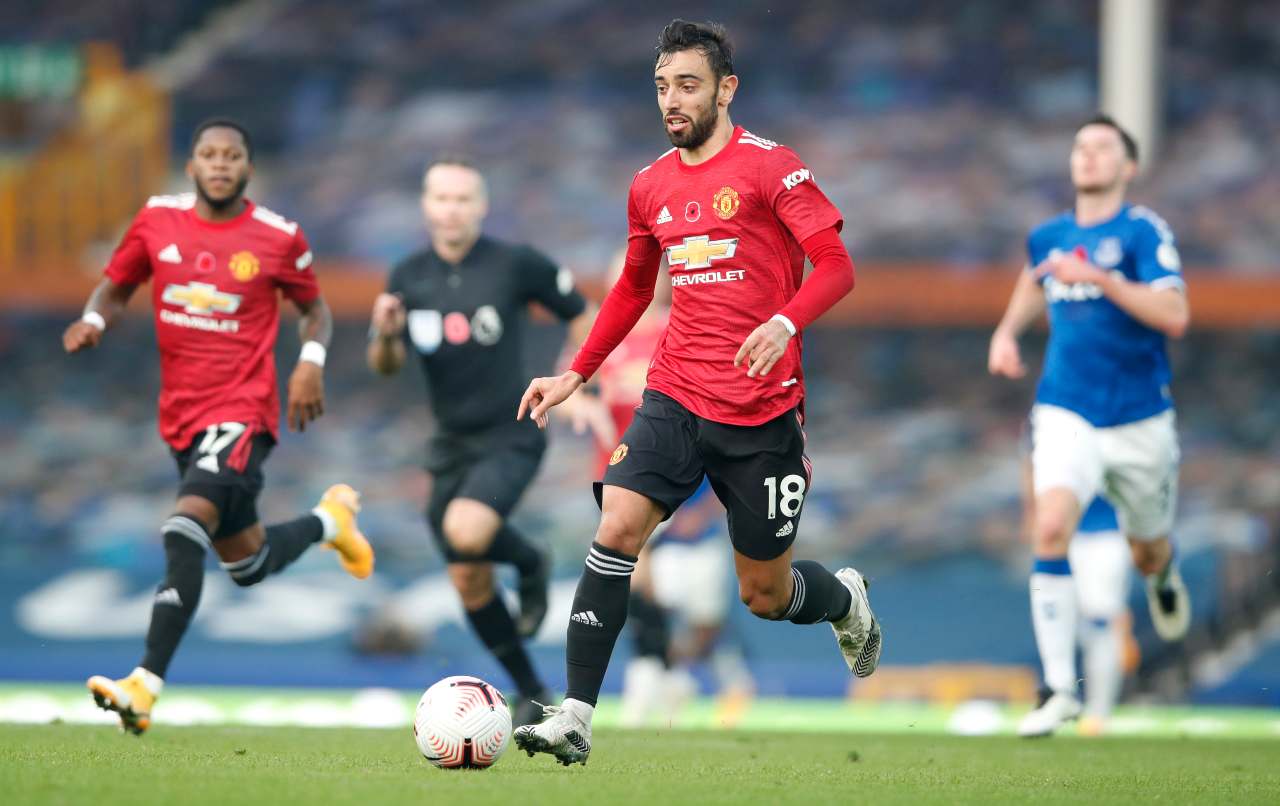
Statistics back up the effort Fernandes puts in on the pitch – and not just those around his goal and assist output. There was talk of him being physically tired when he didn’t do well in United’s goalless draws at Chelsea and Crystal Palace in March 2021 – but no suggestions that he wasn’t putting in the effort or had one eye on helping Portugal retain the European Championship this summer. In reality, he was running like Forrest Gump, and more than any other player on the pitch: 11.5km at Stamford Bridge and 10.8km at Selhurst Park. During the Manchester derby a few days later, he ran even further – a lung-busting 12.1km.
That March showdown was a tricky one for United – they had fallen out of form and seen a mid-January lead at the top of the Premier League table turn into a 14-point deficit, as Manchester City won 15 consecutive league games. But Solskjaer has a habit of getting a result when he needs one – and crucially, he knows how to win at City.
Solskjaer stressed to Bruno the importance of him, Marcus Rashford and Anthony Martial showing up both on and off the ball, because Pep Guardiola’s team were expected to hog possession. If they didn’t do that, the team would lose pressure and shape from the front. Thankfully for the Norwegian, however, the trio followed his instructions to a tee. When they’re all on it, that’s how good Manchester United can be – they often play best against sides who come to play rather than sit back.
That Manchester derby went exactly how United wanted it to. They rode their luck and needed City to squander some opportunities, because the Reds knew the Premier League’s top dogs were going to break their high press. Raheem Sterling had an off day, while Phil Foden and Ilkay Gundogan missed chances, but when Fernandes fired the visitors 1-0 up with a penalty inside two minutes – his 23rd club goal of the campaign – the feeling came back for United’s players: it is once again the norm to win at the Etihad Stadium.
He had also run more than any other player in the Reds’ eight matches before the derby, which staggered coaches at Old Trafford who were used to seeing Scott McTominay or Fred cover every blade of grass. Even after more than a year of excellence at Old Trafford, the Portuguese is continuing to surprise those he works with every day.
Now you see him…
In other ways, though, Bruno doesn’t always emerge on top when it comes to statistics. His goals and assists certainly put him among the leaders in Europe: up to early March, only Luke Shaw (yes, really) and Mason Mount had made more chances in 2021.
And yet, as one United insider tells FFT, “His pass success rate is low and his shot success rate is low – but because he does it so often, you get lots of goals and assists. His efficiency stats aren’t that high, but he performs on the transition. Only Kevin De Bruyne does that really well, but he’s not a traditional No.10.
“Bruno often gets the ball with his back or side to goal and plays blind passes in behind. There aren’t any metrics for blind passes. He plays the sort which catches defences out because he’s not facing forward. They don’t see him looking. The defenders don’t see the head movement because there isn’t any.”
That ‘giving the ball away’ line was touted as a reason why United weren’t sure about signing him back in 2019. The truth was more prosaic – it was financial. But he was brought in eventually, for a fee that may rise to £68m. If Fernandes wins the 2020-21 PFA Player of the Year award, for instance, it will cost the Red Devils another £4.2m.
“Bruno has been unbelievable since he got here – not just on the pitch but off the pitch too,” team-mate Dan James enthuses to FFT. “He’s a real character and he’s brought a lot to the dressing room. You can see that he’s brought a lot to the pitch.
“We do speak quite a bit, because I need to be on the same wavelength as him. If I can know what he’s going to do before he does it, then it’s going to help both of us. In a game, there are times when he’s not even looking at you and you know that he’s seen your first five [yard run]. I’ve seen so many of those balls this season. It’s just great to play with him, and hopefully I can keep having a great connection with him.”
“He boosts your confidence,” adds United right-back Aaron Wan-Bissaka. “He’s always saying, ‘You go forward. Go on. Do it.’”
The baby ultra off the pitch has grown into the leading man on it for one of the biggest football clubs in the world. “Passion, creativity and a winning mentality,” Solskjaer tells FFT when we ask him what Bruno brings to his squad. “Once in a while he can bring a sulk, which sometimes you need. He brings a lot to this team, which is what we wanted from him when we signed him.”
Once in a while he can bring a sulk, which sometimes you need. He brings a lot to this team, which is what we wanted from him when we signed him.
Ole Gunnar Solskjaer on Fernandes
On the same January day that Fernandes sunk Liverpool in the FA Cup with a fantastic free-kick, Solskjaer offered another nugget to show why his midfielder’s sullen side often works in United’s favour.
“Whenever he starts, he doesn’t stay out [late after training],” revealed the Red Devils’ boss. “He’s never happy with me when I tell him to go inside. But he knew he wasn’t starting [this game], so he stayed out practising free-kicks for 45 minutes... and it worked.”
The 26-year-old is doing his best Cristiano Ronaldo impression, and becoming equally talismanic for United.
“He’s added attacking ability, fight, drive and if he doesn’t play there’s a void,” says David May, the former centre-back who now covers matches for MUTV. “He has an eye for a goal, makes key runs forward and comes back like Bryan Robson or a young Roy Keane. I didn’t expect him to be good in the penalty area, but he’s fantastic. He takes free-kicks, corners, and as you probably know by now, penalties. He’s brilliant, and I’m amazed that other clubs didn’t seem to come in for him.”
Is there anything he doesn’t do? May thinks he should show his passion a bit more.
“He has a nasty side and I’d like to see more of it,” adds the man who won two league titles, two FA Cups and the Champions League with the Red Devils. “He doesn’t have to rip people’s heads off, but when United concede a goal I sometimes see no pointing and shouting – which is what you should see. I hate saying ‘when I used to play’ because it was 25 years ago, but I look at the body language of some players now and they’re not hurt when they concede. Bruno hurts.”
“Hello, I’m Bruno Fernandes…”
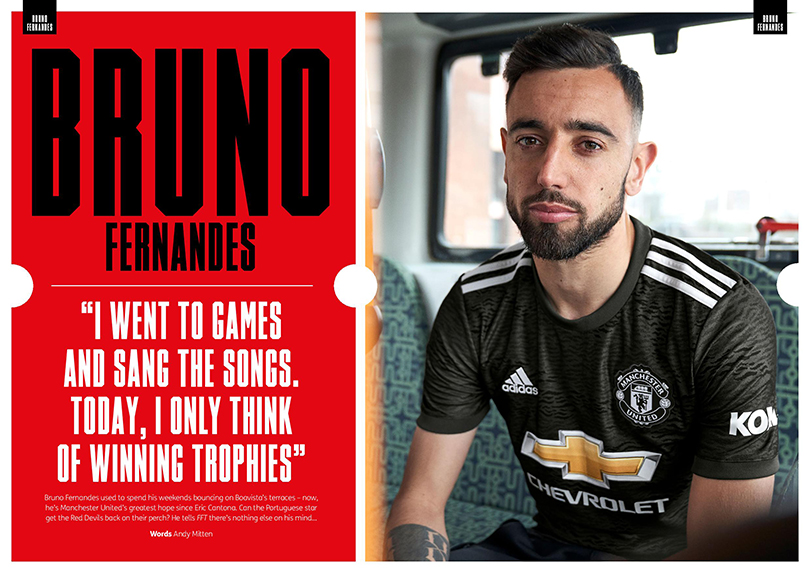
Bruno has been Manchester United’s most successful signing of the post-Alex Ferguson era – admittedly, a time when recruitment has been more ‘s**t’ than miss. He hasn’t been able to turn them into title winners like Robin van Persie did in 2012-13, but joined a side far weaker than Ferguson’s final one – one which had stumbled along in sixth and seventh when third used to be an anomaly.
The club were keen to sign Fernandes in the summer of 2019, but Sporting played hard ball and United got fed up of being played by teams and agents who demanded top dollar – and then some more.
At the centre of the constant speculation was a lad who had moved from Portugal to Serie B side Novara, to start his professional career just before turning 18.
“I wasn’t worried about the speculation,” Bruno tells FFT of the constant media frenzy around him two years ago. “There had been a lot of noise about a transfer in the summer and nothing happened. When January [2020] came, I was completely free of mind. I wasn’t thinking that I would either go to Manchester or not – I was simply happy doing what I was doing. I was in a good place playing at a good club. I was happy at Sporting and didn’t feel I had to leave. If I’d stayed, there would have been no problem – everything was cool and I was doing what I wanted to do. My family was living well and everything was OK.”
So, why did he join United?
“I’d dreamed about playing in the Premier League,” reveals the man who did so well at Novara that he joined Serie A Udinese after one season, then returned to his homeland with Sporting in 2017 via a single campaign at Sampdoria. “Manchester [United] was my dream club. I’d followed Cristiano Ronaldo when he played, and I carried on looking at the club when he left to join Real Madrid.
“But I know so many players who have played for Manchester. I know them because I’m from a country where football is so strong in the culture. Football is always on television, and the Premier League and La Liga were the big two after the Portuguese league. Maybe the Italian league, too. My mates wore tracksuits of Manchester [United], Barça, Madrid, Milan. Manchester was still one of the best teams in the world as I was growing up.”
My mood is really bad the day after we lose. The team wanted a winning mentality and needed one.
Bruno Fernandes
Then, after becoming the best player in his own country, having been scouted on screen and in the flesh by United, the English giants made their pitch. While fees were discussed and contracts inked, boss Solskjaer explained to Bruno what he wanted from him.
“He simply told me to be myself,” says the midfielder. “To enjoy it, to play my own game. He said that he’d watched me for Sporting and that he wanted the same Bruno here – someone who tried to lead the team. It was important that the club trusted me to be me.”
It helped that Fernandes was able to speak English and could walk into the Carrington canteen on day one, practising the now-dead custom of shaking hands with every single first team, reserve and youth player he saw, plus every member of staff. “Hello, I’m Bruno Fernandes,” he said. As if they didn’t know.
“I learned English at school in Portugal, but even more in football,” he reveals. “And when I moved to Italy at Novara, I was doing my first interviews in Italy after just two or three months. One thing in my life is that I try – if I make a mistake, I don’t mind. In language, if I make a mistake with the words, it doesn’t matter because you learn from it.”
The Red Devils’ results had been atrocious before Bruno’s arrival, but they were about to turn – and quickly.
“The day I joined the club was [Manchester] City away,” he remembers of a League Cup semi-final second leg where Nemanja Matic scored the only goal, as United did what has become customary and beat their local rivals in their own back yard. “We won the match, but we didn’t win because we went out of the cup on aggregate. I saw the team which wanted to do a lot better, but which also had a lot to improve.
“Even now, we know that we have a lot to improve, and we know that when our results aren’t good, the mood isn’t the best. I can see that, because when we lose I’m not the best either. My mood is really bad the day after we lose. The team wanted a winning mentality and needed one.”
Now they’ve got one.
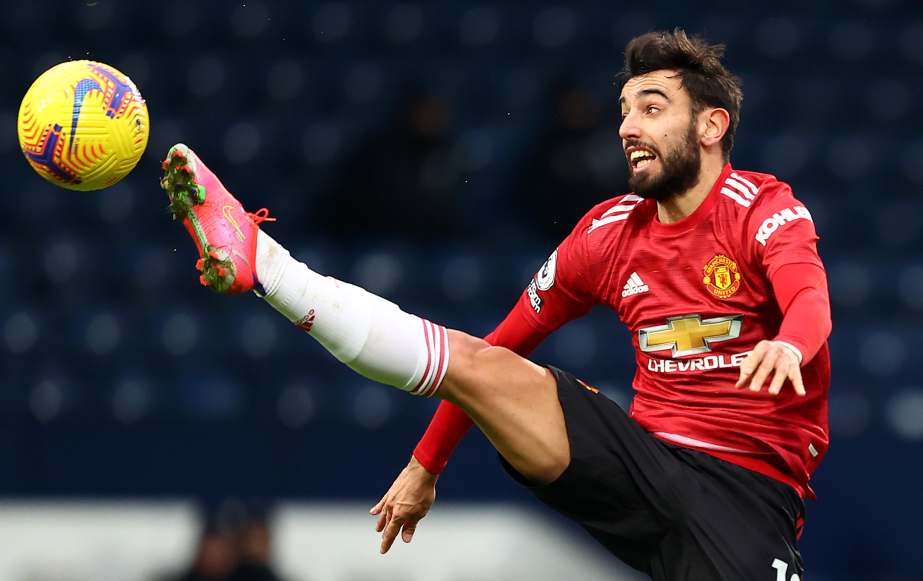
FFT: How would those who know you best describe your personality?
I’d say possibly one word to describe me is ‘demanding’. I can be difficult to understand when I lose – I have a bad mood! The people closest to me know that I’m not happy when I lose. I was like it as a little kid and haven’t changed, so they know how to deal with me. Normally, my father phones me the day after a game whatever the result. If we’ve lost, he won’t speak too much about the match but still has good words for me. He was a player, as was my brother. They’ll tell me what I did wrong and what I could do better next time.
Solskjaer demands a lot from you – what’s your relationship like with him?
Good. It’s good with all of the coaches here and, honestly, if the mood wasn’t good then the results we’re getting wouldn’t come. We have Michael Carrick, too, a great midfielder who I feel I can learn a lot from. I always pay attention when he talks to me.
Manchester United have got better with you, but what does this team need to win the Premier League title?
To win more matches. It’s tough in England, because the games are so tight. Every team genuinely has a chance to win the match. It’s 50/50 before every game, and we see it with the results. But we’re doing better. We can’t drop as many points as we do at home, but we’ve been in second, and at the start of the season there weren’t many people who were saying United would be second. After a few games and a bad start, nobody was saying United could reach the top of the table, but we ignored what people were saying on the outside. We knew what we had said on the inside, we had confidence that things would improve, and they did. We still have to be the best United we can, but we have improved.
How do you motivate yourself to improve?
I demand a lot from myself. I always want to improve, to do better and better. I’m never happy with what we’ve just done in a game, as we could have done more. I’m never fully happy with my performance or when I score or assist, because I could always do more.
You’re driven, intense. So how do you relax away from football?
Sleep! [FFT: Is that it?] When you have young children, the only way to relax is by sleeping! I’ll watch TV series when I’m away with the team, but at home I relax when I play with my kids and it’s important I get that time. We have so many matches and so much travel that I’m away a lot. I’m not at home much, but even there I nap. I also have football on TV in the background, so I watch a lot of it. Boavista and Sporting, my favourite clubs in Portugal, are the teams I watch out for, but I watch Sporting games more because I still have a lot of friends playing there.
But I always watch every single game I see, it doesn’t matter which league. I feel that you can learn something from every single game you watch, from every single player in every division. There are many players who impress me and you’ll know their names, but I study everyone and always have done.
How does the Premier League compare with Serie A and Portugal?
Every league is different – even the mentality of other nations is different. Portugal is more technical and Italy more tactical. In England they say the league is really intense, but for me the intensity is everywhere. I learned so much in Italy because they care about small details. In Portugal, I expressed myself more and had the freedom to display my qualities. Maybe the games are more open in Portugal, because in Italy the matches are tighter and it’s difficult to find your spaces. In England, there are more ways to play. Some sides play like Portuguese teams and others like Italian.
And what about life off the pitch, moving from southern Europe to northern Europe – how does living in Manchester compare?!
It’s difficult to say because everywhere has been shut! We were only here for a short time before lockdown began. We’d found a house and worked out where the supermarket was, so hadn’t visited the city centre, but I adapted quickly. My family have done as well, but it’s been more difficult for the kids because they have to spend most of the time at home and can’t understand why.
My daughter is four. It’s hard to explain to her that she’s not allowed to go and explore this new place where we’re living, or that she has to use a mask. But everyone’s in a similar position. I’m lucky that I have the chance to play football and enjoy my job – albeit with some restrictions. But at least I can still play. Kids haven’t been able to play in the same way that my daughter can leave home or go to the park or school.
All that glitters
You don’t need an audience with the man himself to see just what an impact he’s made at Manchester United, but that intense focus to succeed becomes clearer in conversation.
Fernandes won’t stop until he’s helped take United where he wants them to be – although in terms of his own output, he could hardly be doing more. In his first 66 Red Devils outings up to mid-March, the Portuguese midfielder had already played a direct role in 55 goals (35 scored himself, plus 20 assists). He has created more chances in the Premier League than any other player this season.
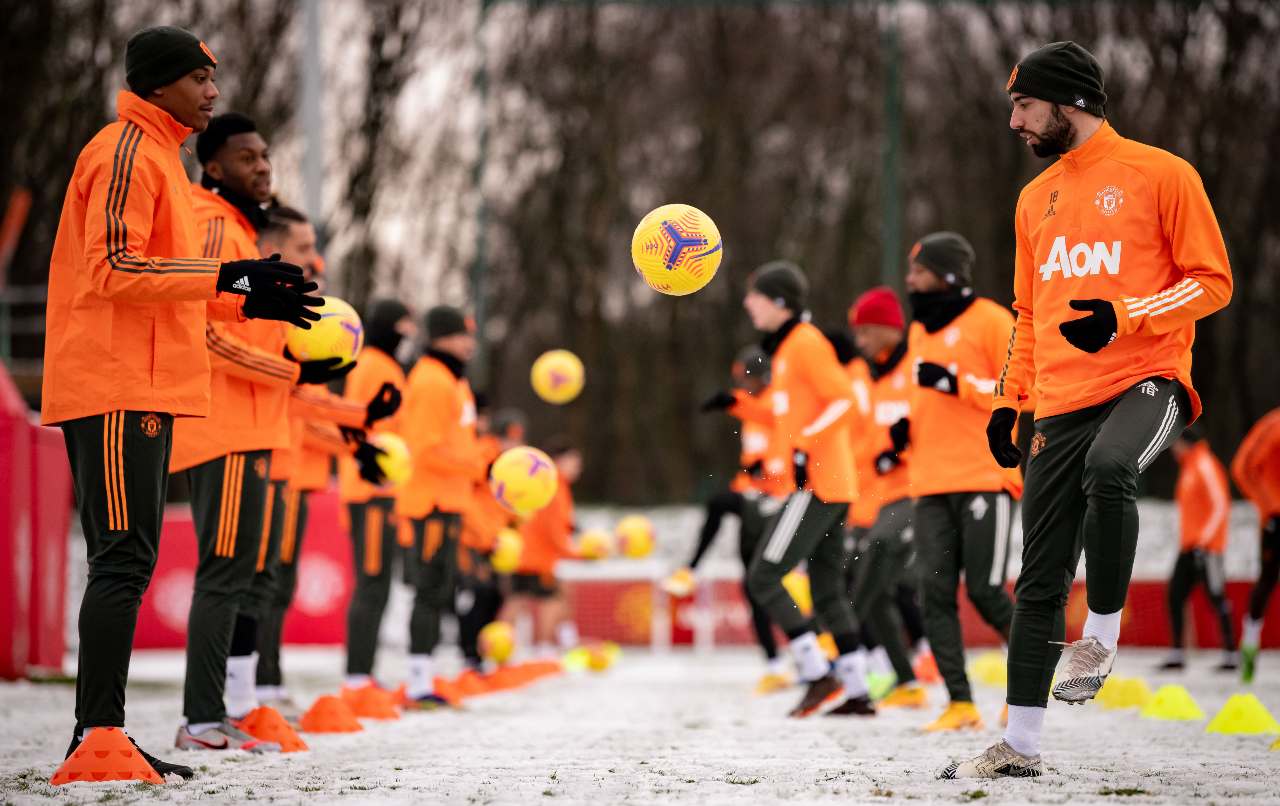
Bruno delivers, but critics say that much like his team, he doesn’t produce enough against the biggest teams. Or they say too many of his goals are penalties – the specialist was on nine this term by the beginning of April, ‘chasing’ Andy Johnson’s all-time record of 11 set for Crystal Palace in 2004-05. Only five players have ever scored 10 spot-kicks in a single campaign.
“How many do you see get missed in big situations?” asks former United defender Rio Ferdinand. “You’ve got to have the minerals to step up and take them, and he’s got that.
“I love the way he’s a leader in the way he takes responsibility, and I think the impact he’s had on this team... there won’t be more than a handful of guys who have had similar impacts in the way he’s come in and done what he’s done for one football club.”
Fernandes can’t do it alone, though, and Solskjaer would like more players of his class around to turn United back into a side which wins titles again. Bruno wants that, too.
“Trophies,” he tells FFT before our time is up, as we conclude by asking what he would be happy with at Old Trafford. “We can’t think of anything else at this club.
“United is made for trophies and the whole mood is around that. We reached the semis [of the League Cup] and lost to City, but that’s not enough. That wasn’t our time – we need to be in finals, and to win them.”
This mini ultra has come a long way – but he’s not satisfied yet.
Subscribe to FourFourTwo today and get your first five issues for just £5 for a limited time only - all the features, exclusive interviews, long reads and quizzes - for a cheaper price!
NOW READ
QUIZ Can you name every starting line-up to win a European trophy at Manchester United?
WATCH Premier League live streams: How to watch every game this week, from anywhere in the world

Andy Mitten is Editor at Large of FourFourTwo, interviewing the likes of Lionel Messi, Eric Cantona, Sir Alex Ferguson and Diego Maradona for the magazine. He also founded and is editor of United We Stand, the Manchester United fanzine, and contributes to a number of publications, including GQ, the BBC and The Athletic.
